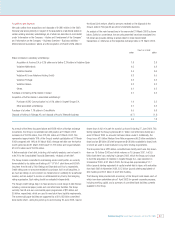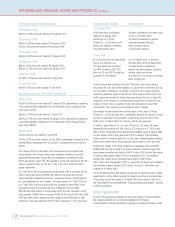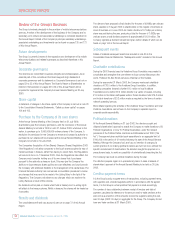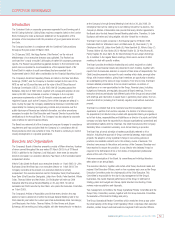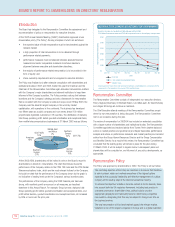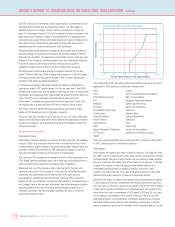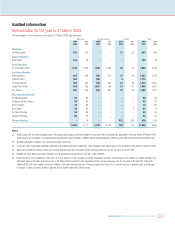Vodafone 2003 Annual Report Download - page 55
Download and view the complete annual report
Please find page 55 of the 2003 Vodafone annual report below. You can navigate through the pages in the report by either clicking on the pages listed below, or by using the keyword search tool below to find specific information within the annual report.
Vodafone Group Plc Annual Report & Accounts and Form 20-F 2003 53
CORPORATE GOVERNANCE
Introduction
The Combined Code on corporate governance appended to and forming part of
the UK Listing Authority’s Listing Rules requires companies listed on the London
Stock Exchange to make a disclosure statement on the application of the
principles of and compliance with the provisions of good governance set out in
the Code.
The Company has been in compliance with the Combined Code provisions
throughout the year ended 31 March 2003.
On 20 January 2003, the Higgs Review, (“the Review”) on the role and
effectiveness of non-executive directors was published. The Review has
continued the “comply or explain” philosophy of earlier UK corporate governance
reports. The Review has published suggested revisions to the Combined Code
(which also incorporate the recommendations of the separate Report of Sir
Robert Smith in relation to audit committees) that are expected to be
implemented later in 2003 after consideration by the Financial Reporting Council.
The Company’s American Depositary Shares are listed on the New York Stock
Exchange (“NYSE”) and the Company is therefore subject to the rules of the
NYSE as well as US securities laws and the rules of the US Securities and
Exchange Commission (“SEC”). In July 2002, the US Congress passed the
Sarbanes-Oxley Act of 2002 which, together with consequent adoption of new
rules by the SEC, has introduced a number of changes to the corporate
governance requirements on both US domestic companies and non-US
registered issuers such as the Company. Some of the changes are already in
force. During the year, the Company established a Disclosure Committee with
responsibility for reviewing and approving controls and procedures over the
public disclosure of financial and related information, and other procedures
necessary to enable the Chief Executive and Financial Director to provide their
certifications of the Annual Report. The Company has also adopted a corporate
code of ethics for senior financial officers.
The Board has reviewed all of the changes and proposed changes to compliance
requirements and has concluded that the Company is in compliance with all
those provisions which are currently in force. The Board is continuing to monitor
closely developments in corporate governance.
Directors and Organisation
The Company’s Board of directors presently consists of fifteen directors, fourteen
of whom served throughout the year ended 31 March 2003. As at 31 March
2003, in addition to the Chairman, Lord MacLaurin, there were six executive
directors and seven non-executive directors. Paul Hazen is the nominated senior
independent director.
Vittorio Colao joined the Board as an executive director on 1 April 2002. Dr John
Buchanan joined the Board as a non-executive director on 1 April 2003. The
Company considers all its present non-executive directors to be fully
independent. The executive directors are Sir Christopher Gent (Chief Executive),
Arun Sarin (Chief Executive Designate), Julian Horn-Smith, Peter Bamford, Vittorio
Colao, Thomas Geitner and Ken Hydon. Sir Christopher will retire as Chief
Executive after the Annual General Meeting on 30 July 2003. He will be
succeeded as Chief Executive by Arun Sarin, who joined the Executive Committee
on 1 April 2003.
The Company’s Articles of Association provide that every director who was
elected or last re-elected at or before the Annual General Meeting held in the
third calendar year before the current year shall automatically retire. Accordingly,
Lord MacLaurin, Ken Hydon, Thomas Geitner, Sir Alec Broers and Jürgen
Schrempp will be retiring and, being eligible, will offer themselves for re-election
at the Company’s Annual General Meeting to be held on 30 July 2003. Sir
Christopher Gent will be retiring but is not offering himself for re-election. The
Company’s Articles of Association also provide that every director appointed to
the Board since the last Annual General Meeting shall retire. Therefore, Dr John
Buchanan will retire and, being eligible, will offer himself for re-election.
The Board met on eight occasions in the financial year to 31 March 2003.
Individual directors’ attendance was: Lord MacLaurin (8), Paul Hazen (7), Sir
Christopher Gent (8), Julian Horn-Smith (8), Peter Bamford (8), Vittorio Colao (7),
Thomas Geitner (8), Ken Hydon (8), Dr Michael Boskin (5), Sir Alec Broers (8),
Penny Hughes (8), Arun Sarin (8), Sir David Scholey (8) and Jürgen Schrempp
(5). In addition to the regular Board meetings, there were a number of other
meetings to deal with specific matters.
The Board provides the effective leadership and control required for a listed
company. Actual financial results are presented to each meeting, together with
reports from the executive directors in respect of their areas of responsibility. The
Chief Executive presents his report to each meeting which deals, amongst other
things, with investor relations, giving Board members an opportunity to develop
an understanding of the views of major investors. From time to time, the Board
receives detailed presentations from non-Board members on matters of
significance or on new opportunities for the Group. Financial plans, including
budgets and forecasts, are regularly discussed at Board meetings. The non-
executive directors periodically visit different parts of the Group and are provided
with briefings and information to assist them in performing their duties. The non-
executive directors (including the Chairman) regularly meet without executives
present.
The Board is confident that all its members have the knowledge, talent and
experience to perform the functions required of a director of a listed company.
On appointment, all directors are provided with appropriate training and guidance
as to their duties, responsibilities and liabilities as a director of a public and listed
company and also have the opportunity to discuss organisational, operational and
administrative matters with the Chairman, the Chief Executive and the Company
Secretary. When considered necessary, more formal training is provided.
The Board has a formal schedule of matters specifically referred to it for
decision, including the approval of Group commercial strategy, major capital
projects, the adoption of any significant change in accounting policies or
practices and material contracts not in the ordinary course of business. The
directors have access to the advice and services of the Company Secretary and
have resolved to ensure the provision, to any director who believes it may be
required in the furtherance of his or her duties, of independent professional
advice at the cost of the Company.
Performance evaluation of the Board, its committees and individual directors
takes place on an annual basis.
The executive directors, together with certain other Group functional heads and
regional Chief Executive Officers, meet on ten occasions each year as the Group
Executive Committee under the chairmanship of the Chief Executive. This
Committee is responsible for the day-to-day management of the Group’s
businesses, the overall financial performance of the Group in fulfilment of
strategy, plans and budgets and Group capital structure and funding. It also
reviews major acquisitions and disposals.
Two management committees, the Group Operational Review Committee and the
Group Policy Committee, oversee, together with the Group Executive Committee,
the execution of the Board’s strategy and policy.
The Group Operational Review Committee, which meets ten times a year under
the chairmanship of the Group Chief Operating Officer, comprises other executive
directors, certain Group functional heads and regional Chief Executive Officers.


